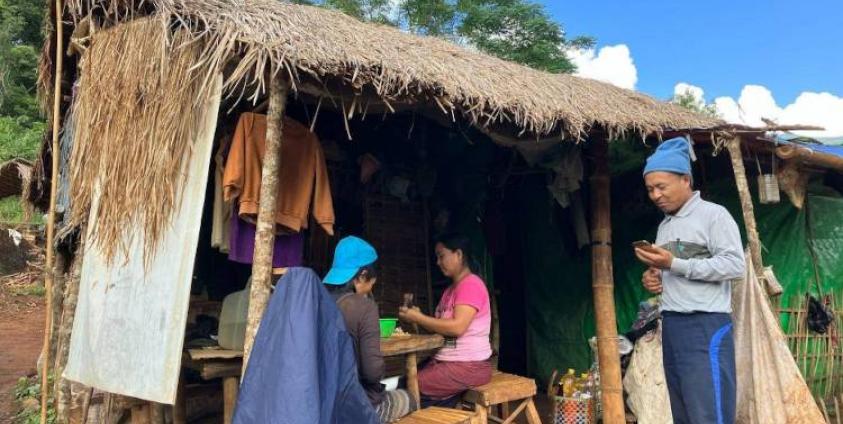Many people from the war-torn Karenni State have been fleeing the war for more than a year. As the time has passed, the war refugees say that they need help for long-term livelihood.
Last year, war refugees and some people were able to cultivate in their farmlands, but this year they cannot do the same due to various difficulties. As the price of goods has increased significantly, the situation may become very worrying in the next 6 months, a member of the Karenni War Refugee Assistance Network said.
“We could distribute one or two-pyi of rice per family before. Sometimes we divided the whole rice bag into three bags which meant each family could get five-pyi of rice. But currently, we can only distribute rice by the measurement with condensed milk tins. Even so, it is not enough to cover all people. Other organizations also help us, but things are not completely convenient. For now, we can still distribute a little rice. But there was no rice cultivation for this year. So, the situation may get worse in the next 6 months”, he suggested.
In addition, there are difficulties in transportation to the remote war refugee camps, altruists helping the refugees said. Also, since the number of donors is less than before, refugees have to solve their daily lives in various ways, said Ko Yawhan, a local from western part of Demoso who fled from war.
“Donors become less, so it is very difficult for us. For example, previously one or two groups of donors were coming every week, yet the requirements were not sufficient. For now, at most only two groups could come for the entire month. Even so, they cannot fully support us. We are facing More and more difficulties. Rice, oil and salt are needed for cooking. Sometimes I have to borrow basic food items from others and cook. We have to solve the problems in various ways to make it convenient”, Ko Yawhan said.

U Kyaw Ni, who has been fleeing the war for more than a year in a camp on the western side of Demoso, said that he is mainly dependent on donors and eats frugally with the food received from donors.
“We eat frugally every day. We used to reheat the leftover rice and ate it. When the economy is very tight, we adults eat one meal less. We feed our child according to the regular quota”, U Kyaw Ni said.
Currently, the war victims are completely dependent on domestic and foreign donors. International organizations like the World Food Programme (WFP) also need to help the refugees, a member of the Karenni War Refugee Assistance Network said.
“I would like to ask international organizations like WFP to help the refugees effectively. Now they go to the places where help is not actually needed and neglect the places that do. If international organizations also help and the donors continue to donate, it will be better”, he said.
On May 6, WFP provided 7 pyi of rice, a liter of oil, a bag of salt, and a viss of beans to the residents in Dawtama Ward of Loikaw City.
There are more than 200000 war refugees in Karenni State. Some are taking shelter in refugee camps in the State while others are arriving at the refugee camps outside the region.
Clashes are ongoing every day in Mongpai, Pekon, Demoso and Hpruso, so the locals are still far from returning home. Furthermore, homes of the refugees were damaged or destroyed by the artillery shells or arson.







